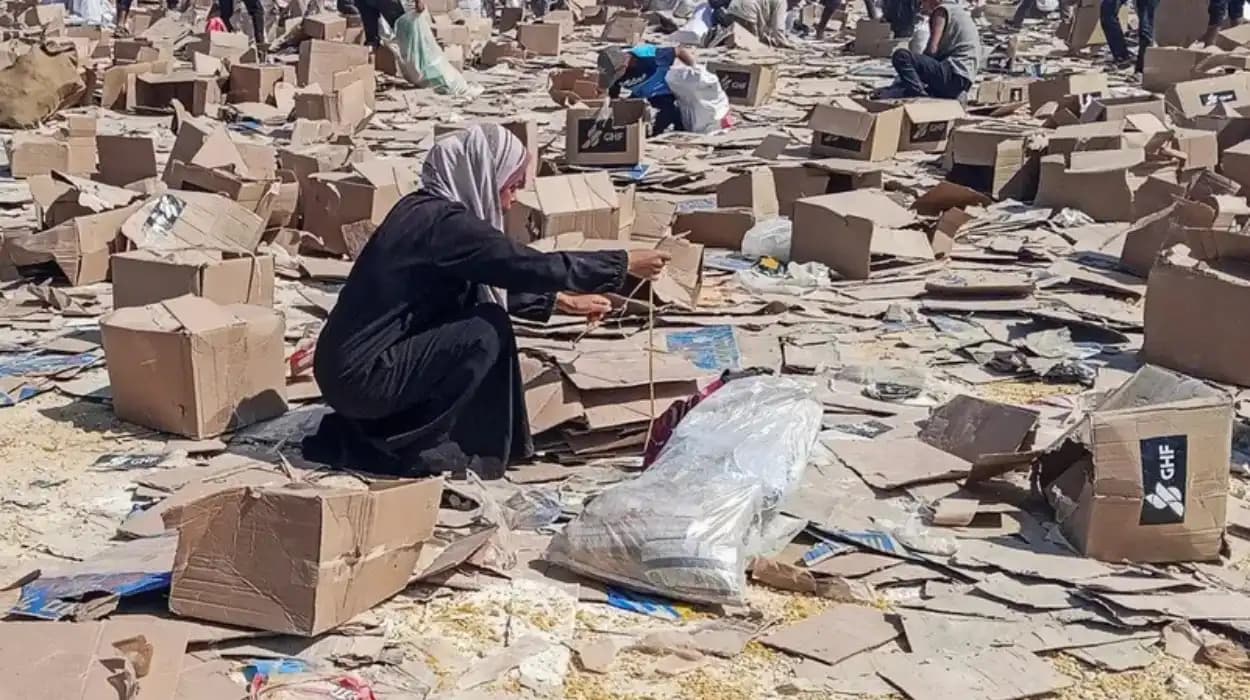The International Committee of the Red Cross (ICRC) has issued a grave warning about the devastating impact of a recent surge in casualties linked to aid distribution sites in Gaza. Since late May 2025, the health system in Gaza has been pushed beyond its limits by a sharp increase in deaths and injuries occurring around these sites, where thousands of Palestinians gather to receive essential food and medical aid amid an ongoing blockade and conflict.
The ICRC’s field hospital in southern Gaza has recorded over 200 deaths and treated more than 2,200 patients wounded by weapons in more than 21 separate mass casualty events since the launch of new aid distribution efforts in late May. This unprecedented scale and frequency of mass casualty incidents have overwhelmed Gaza’s already shattered healthcare infrastructure.
Aid Distribution Sites Become Deadly Flashpoints
The Gaza Humanitarian Foundation (GHF), a US- and Israeli-backed private initiative, began operations on May 26 after an 11-week Israeli blockade halted supplies into the Gaza Strip, sparking warnings of imminent famine. The GHF replaced the United Nations and other independent agencies in distributing aid. However, the distribution process has been marred by chaotic scenes and near-daily reports of Israeli forces firing on Palestinians waiting to collect rations.
More than 500 people have been killed while waiting to access food rations at these distribution points, according to the UN Human Rights Office. The ICRC has described the rise in violent incidents at aid sites as “without precedent,” with many victims suffering gunshot and shrapnel wounds.
Gaza’s Healthcare System: On the Brink of Collapse
The health system in Gaza was already fragile before this surge in casualties. Months of Israeli bombardment, a crippling blockade, and repeated displacements have devastated hospitals and clinics. Nearly all public hospitals are either shut down or severely damaged, and the few remaining facilities operate under critical shortages of medicine, fuel, and equipment.
The ICRC’s field hospital in Rafah, the last fully operational hospital in southern Gaza, has had to activate its mass casualty protocol 12 times in just two weeks, responding to the influx of patients with severe injuries. Medical staff face overwhelming pressure, with limited resources and insufficient personnel to meet the demand.
To cope with the influx of wounded, the ICRC reports that all hospital staff are now engaged in emergency response roles. Physiotherapists assist nurses by cleaning and dressing wounds and taking vital signs, cleaners serve as orderlies carrying stretchers, and midwives have taken on palliative care duties. This all-hands-on-deck approach underscores the dire situation facing Gaza’s healthcare providers.
Humanitarian Crisis Deepens Amid Blockade and Conflict
The blockade imposed by Israel and Egypt has severely restricted the flow of food, medical supplies, and fuel into Gaza, exacerbating the humanitarian crisis. The destruction of infrastructure and ongoing hostilities have left millions of Palestinians without adequate access to healthcare, clean water, and electricity.
The situation is compounded by repeated evacuation orders and displacement, which disrupt access to medical facilities and further strain the healthcare system. The ICRC has called for urgent protection of medical personnel and facilities, emphasizing that safeguarding these lifelines is critical to preventing further loss of life.
Voices from the Ground: The Human Toll of Aid Distribution Violence
Residents of Gaza describe the aid distribution sites as dangerous and chaotic. Many Palestinians risk their lives daily to obtain food and medicine, only to face the threat of violence. One local aid worker stated,
“People are desperate. They wait for hours, sometimes days, to get basic supplies, but the fear of being shot or injured is constant.”
Medical staff recount harrowing scenes of treating victims of shootings and explosions near distribution points. The ICRC’s report highlights that the majority of patients arriving with gunshot wounds were attempting to reach aid, illustrating the deadly intersection of humanitarian need and conflict.
International Calls for Immediate Action
The ICRC and other humanitarian organizations have repeatedly urged all parties to respect international humanitarian law, particularly the protection of civilians and aid workers. The targeting or endangerment of people seeking humanitarian assistance constitutes a grave violation of these laws.
The United Nations has expressed deep concern over the escalating violence at aid sites and called for immediate measures to ensure safe access to food and medical aid for Gaza’s population. The UN Human Rights Office warned that the killing of civilians waiting for aid is unacceptable and must be investigated.
The Broader Implications for Gaza’s Future
The surge in casualties at aid distribution points is symptomatic of the broader crisis engulfing Gaza. The destruction of healthcare infrastructure, combined with ongoing hostilities and blockade, threatens to push the territory into a catastrophic humanitarian disaster.
Experts warn that without urgent international intervention to secure safe aid delivery and protect medical services, Gaza’s health system will collapse entirely, leaving millions vulnerable to preventable death and disease.
A Dire Warning and a Call for Protection
The ICRC’s warning highlights the catastrophic strain on Gaza’s health system caused by a surge in casualties linked to aid distribution sites. The unprecedented scale of deaths and injuries, combined with the destruction of medical infrastructure and ongoing conflict, paints a bleak picture for the future of Gaza’s population.
As the ICRC states,
“The scale and frequency of these incidents are without precedent,”
and the need to protect civilians, medical personnel, and aid operations has never been more urgent. The international community faces a critical test: to ensure that humanitarian aid reaches those in desperate need without further loss of life and to uphold the principles of human dignity amid conflict.
